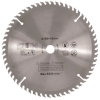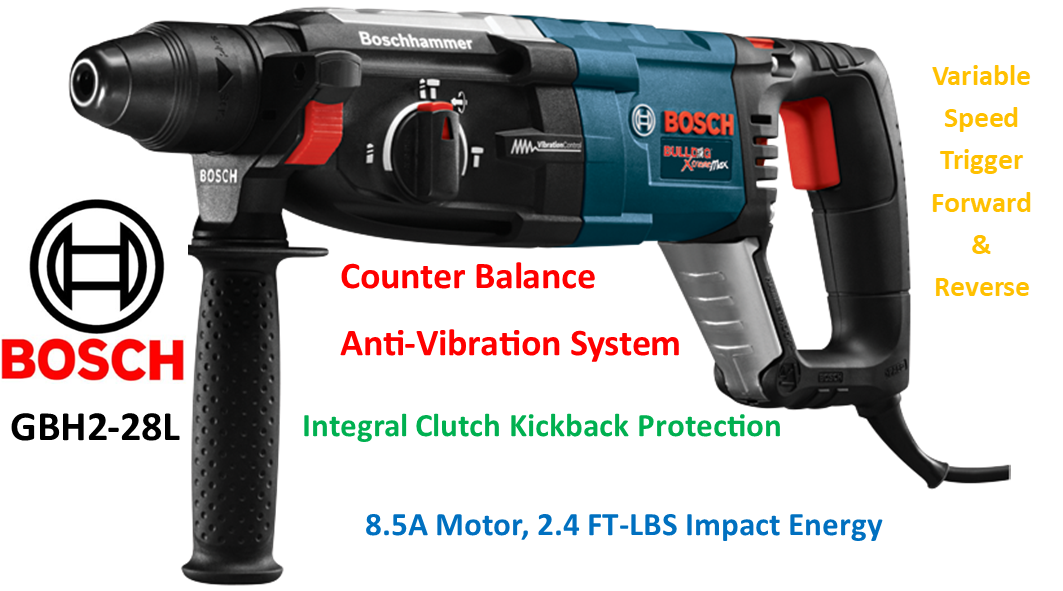Another review featuring DeWalt as the forerunner. This time we’re talking about rotary hammer drills. The DeWalt D25263K 1¹⁄₈” power rotary hammer drill is quite exceptional in its capabilities and superb design. DeWalt is not alone as a top contender, we’ve searched for some of the most worthy rivals for this champion of power tools brands.
There will always be the usual suspects, and DeWalt vs Milwaukee remains a hot topic. It seems only fitting to include the Milwaukee 5268-21 1¹⁄₈” rotary hammer drill in this review. There are two more models that cannot be ignored if we’re truly going to be comparing the best SDS rotary hammer drills. So the Bosch GBH2-28L 1¹⁄₈” and Makita HR2475 1” have to be included to complete the debate.
You know how some tools make a lasting impression. A memorable machine that forever remains imprinted in your psyche as the best of its kind. When it comes to rotary hammer drills, my Bosch Bulldog Extreme is one such power tool. For over 20-year, my faithful Bulldog has endured treacherous punishment and always risen to the challenge.
Now, this is just a personal affinity I have. I’m not saying that the Bosch Bulldog Rotary Hammer drill is the best there is. I’ve just developed enormous respect for this rugged battle horse. It seems only logical that I would include a Bosch model in this review. The Bosch GBH2-28L is a larger, more powerful version of my 1” rotary hammer drill, and a little more expensive. It’s probably the closest Bosch model to compare with the DeWalt D25263K, which is why I’ve chosen it for this rotary hammer drill review.
My regular readers will know how I feel about DeWalt. It is, in my view, the top power tool brand. The DeWalt D25263K is also a top choice on Amazon and most power tools review sites. As much as my Bosch Bulldog has won a special place in my heart, I have to rank the DeWalt 1¹⁄₈” SDS rotary hammer drill as one of the very best.
It’s almost an unwritten rule. When reviewing DeWalt power tools, you have to compare it to their biggest rival, Milwaukee. To this end, the Milwaukee 5268-21 1¹⁄₈” rotary hammer drill is the most obvious choice. Another one of my top choices has to be the Makita HR2475. I absolutely love the brand and feel that it deserves all the respect that is attributed to DeWalt and Milwaukee.
This rotary hammer drill comparative review is a bit like WWII all over again. The Germans and Japanese vs the top two American power tool brands.
Let the battle commence.
DeWalt D25263K 1¹⁄₈” SDS Rotary Hammer Drill
Features:
- 3 Joules of impact energy
- 5 Amp high-performance motor
- SHOCKS – Active Vibration Control, reduced vibration felt in the handles.
- Integral clutch reduces sudden, high torque reactions.
- The rotating brush ring delivers full speed/torque in forward and reverse.
Review:
The Bosch D25263K is a very capable SDS rotary hammer drill. The 1¹⁄₈” SDS chuck can accommodate large bits and chisels, providing an optimal drilling capacity in concrete of ¼ to ¾ inch. It has the power to do this with incredible speed and very little effort. Not to mention, a good deal of user comfort.
The DeWalt 1¹⁄₈” SDS chuck is superb in every way. The bits slot into position perfectly, every time, and remain locked in position, no matter what you do. That’s a good start for any rotary hammer drill. Squeeze the trigger, and you can feel the 8.5A 120V motor rearing to go. Ready to blast through the toughest concrete. When using a drill of this caliber, power is everything.
This machine delivers pretty well on the power front. With 3-joules of impact energy, the DeWalt D25263K can be rated in the higher echelons of industrial rotary hammer drills. You have perfect control, using a well-calibrated trigger switch. It gives a wonderful range of 0 – 5,350 BPM and speed from 0 to 1,450 RPM. In a bind-up situation, all that power can be detrimentally dangerous. This is where you’ll really appreciate the integral clutch. It is a trustworthy, reliable mechanism that disengages the torque to the bit when it jams. The most important safety feature on any rotary hammer drill.
The handle design is excellent. The trigger switch is at the top, allowing for perfect speed control, whilst maintaining a firm grip on this powerful beast of a machine. The SHOCKS vibration control system works well. Two vibration dampers, at the top and bottom of the handle, ensure that you can keep working for hours without fatigue. In addition to this, the handle has great padding. Vibration at the handle is 9.8M/S².
While the DeWalt D25263K is designed primarily for drilling and chiseling hard materials, like concrete, you can also use it for wood and steel. For this an adapter is available.
The D-Shape handle, with a design favoring tool length, is great for many applications. Unless you need to work in tight spaces, this is the best way to go. The DeWalt D25263K measures 17.5” in length and weighs 6.8-pounds. Not bad for such a powerful drill. For concrete drilling, dust extraction is important. Silica dust is an ever-present hidden danger. The DeWalt D25263K is compatible with the D25301D Dust Extractor Telescope, guaranteeing a clean, healthy working environment.
The DeWalt D25263K 1¹⁄₈” SDS rotary hammer drill has what it takes to meet the challenges of the construction industry. It is powerful and robust, with all the health and safety features we require. It is relatively lightweight and comfortable to use. An all-round champ. I’ve always been mighty impressed with the DeWalt 3-year warranty, 1-year free service plan, and 90-day guarantee. Well, they’ve upped the ante with this one. The DeWalt D25263K has an amazing 2-year free service plan. Just the thing for contractors who expect the very best performance in a hardworking environment.
Milwaukee 5268-21 1¹⁄₈” Rotary Hammer Drill
Features:
- Powerful 8-amp motor: Delivers 0-1,500 RPM, 0-5,500 BPM and 3.6ft-lbs of impact energy.
- All-Metal Gear Case: Provides Maximum Durability for Jobsite Conditions.
- AVS Anti-Vibration System: Minimizes vibration for maximum comfort. Minimized Vibration to 10.6 m/s².
- Mechanical clutch: Protects the motor when the bit binds up.
- Variable Position Chisel Stop: Allows material to be adjusted, regardless of orientation.
Review:
As is so often the case, the Milwaukee 5268-21 blows the competition out of the water when it comes to extreme power. I don’t how they do it, but Milwaukee drills and drivers seem to deliver power that cannot be matched by any other power tool brand.
The Milwaukee 5268-21 utilizes an 8A electric motor, 0.5A less than the DeWalt D25263K – reviewed above. One would think that with fewer amps, and consequently fewer watts, the Milwaukee rotary hammer drill won’t be able to compete with the DeWalt D25263K. Surprisingly, the Milwaukee is way more potent, with a jaw-dropping 3.6 Ft LBS impact energy. If we’re going to compare this with the DeWalt 3-joules spec, we need to do a small mathematical conversion: 3.6 foot-pounds is equivalent to 4.9 Joules. The Milwaukee 5268-21 is about 60% more powerful than the DeWalt D25263K, despite the lower amperage motor. This gives you 3” core bit drilling capacity. Wow!
This power translates into more blows per minute (5,500 BPM) and slightly faster drill speed (1,500 RPM), with a lot more brute power at your disposal. The bottom line is that you will be able to drill through harder material, much faster, using the Milwaukee drill vs the DeWalt D25263K. For that matter, just about any other 1¹⁄₈” rotary hammer drill.
All that power does take a toll on your hands though. Despite an excellent anti-vibration system, every bit as good as DeWalt, the Milwaukee 5268-21 has an unavoidably higher vibration level of 10.6 m/s². More energy, producing more blows per minute, will obviously increase vibration at the handle.
Some may prefer the drop motor design with a larger grip on the handle. It decreases the length of the drill, which can be an advantage when working in a confined space. The Milwaukee 5268-21 has a total length of 12.5” – 5” shorter than the DeWalt D25263K. I find the longer drill more comfortable to use when drilling downwards into the floor and, generally, easier to handle. Though, both designs have their pros and cons. The Milwaukee 5268-21 is a pretty heavy machine at 7.5 pounds.
The trigger switch is great, giving optimal control over a variable speed of 0 – 1,500 RPM and 0 – 5,500 BPM. You also have three modes, selected by a dial on the side of the drill: hammer drill, hammer only (for chisel), or rotation only (for wood or steel). You are protected from a bit bind up by an excellent clutch.
The Milwaukee 25263K is a super tough, awesomely powerful rotary hammer drill. It’s a little on the heavy side. Given the immense power that this machine delivers, the actual power to weight ratio is better than most. In this light, the extra weight is perfectly acceptable. Milwaukee probably has the best warranty in the business, an incredible 5-years.
Bosch GBH2-28L 1¹⁄₈” Rotary Hammer Drill
Features:
- Robust 8.5-amp motor – delivers 2.4 Ft.-Lbs. of impact energy for reliable Bulldog performance.
- KickBack Control – uses an integrated sensor to stop tool rotation during bit bind-up situations.
- Counter-balanced Vibration Control – improves user comfort during drilling or chiseling applications.
- Vario-Lock – rotates and locks chisel to optimize working angle.
- Variable-speed trigger with reversing – offers accurate bit starting.
- HammerHook – allows quick tool storage during the job.
- D-handle design – ideal for overhead and downward drilling applications.
- Multi-function selector – three modes of operation: drilling only, hammer drilling, and chiseling.
- SDS-plus® bit system – tool-free bit changes with automatic bit locking.
Review:
Bosch invented the electro-pneumatic rotary hammer drill way back in 1932. They have been a leader in this field ever since. In 1975, Bosch again revolutionized the rotary hammer drill by inventing the “Steck-Dreh-Sitz”, now known as the Special Direct System (SDS). This is the chuck and bit system that defines all SDS rotary hammer drills. We certainly owe a lot to the brand as far as heavy-duty drilling goes. Little wonder, the Bosch Bulldog trademark is so respected in the construction industry. Like so many, I’m a devoted fan of these indestructible rotary hammer drills.
Like most 1¹⁄₈” rotary hammer drills, the Bosch GBH2-28L has a pretty powerful 8.5A motor. With 2.4 FT-LBS impact energy, it delivers a little more power than the DeWalt D25263K. Not nearly the same kind of punch as the Milwaukee 25263K. Then again, no rotary hammer drill can hold up against the Milwaukee titan, when it comes to brute force. The variable speed and impact range is good: 0 – 5,100 BPM and 0 – 1,300 RPM.
I like the longer horizontal motor setup. Though this will always be a matter of user preference. It will depend on the type of work you perform most of the time. The 17.4” length offers a distinct advantage for overhead and downward drilling or chiseling. The power to weight ratio is better than most. The Bosch GBH2-28L weighs 6.9 pounds, with above average power. The weight distribution is great, making it an easy machine to use. Selecting rotary hammer, chisel, or drill only functions are done in the usual manner, with a large dial at the side.
Comfort is greatly enhanced by an incredible counter-balance anti-vibration system. In general, I’ve found Bosch Bulldog Xtreme rotary hammer drills to be amongst the easiest and most comfortable to use. It also has a wonderful antikickback system and one of the best dust control systems. This drill is compatible with the on-tool 18V Bosch GDE18V-26D. Although a little bulky, this cordless dust extractor is amazing if you don’t have a shop vac available. It also means you don’t have a cumbersome vacuum hose trailing behind you. You also have the option to use more conventional dust extraction hoods, connected to a vacuum extractor. Both the Bosch HDC100 and HDC200 dust extraction hoods can be used with this drill.
I know many who share my opinion that Bosch Bulldog SDS rotary hammer drills are fantastic machines. They have proven, over a long time, to be solid and reliable power tools. The Bosch GBH2-28L matches up well to any of the best 1¹⁄₈” rotary hammer drills, as a powerful and durable product. The brand is has been at the top of the industrial drilling game for as long as it has been a thing.
Download: Bosch GBH2-28L User Manual [PDF]
Makita HR2475 1” Rotary Hammer Drill
Features:
- Powerful 7.0 AMP motor delivers 0 to 1,100 RPM & 0 to 4,500 BPM.
- Torque limiting clutch engineered to prevent gear damage.
- Sequential impact timing delivers timed hammering during rotation to minimize overlapping bit impacts resulting in up to 50 percent faster drilling.
- Extended life brushes.
- 40 bit angle settings allow the bit to be set at different positions for operating convenience.
- 3 mode operation for “”Rotation Only””, “”Hammering with Rotation”” or “”Hammering Only”” for multiple applications.
Review
I’ve said it before, and I’ll say it again: Makita tools are about the toughest I’ve ever owned. Possibly the best in this regard. The Makita HR2475 has an incredibly durable motor with longer brush life. Dual ball bearings on the armature are also a distinct advantage for longer tool life and durability.
While not exactly cheap, the Makita 1” rotary hammer drill is worth it for the sheer engineering brilliance. When researching this article, I found the Makita HR2475 on Amazon at a discount of more than 50%, just under $180. At this price, it is much more attractive. Closer in price to the DeWalt D25263K.
Some may not appreciate the price tag, especially when you consider that this a 1” SDS rotary hammer drill with a 7A motor. All the others in this review are 1¹⁄₈” drills with a more powerful 8.5A motor. So the Makita HR2475 does not have quite the same capacity, and costs more than many others. None the less this is a very competent machine for its class. With 2.7 joules impact energy it is only a little less powerful than the DeWalt 1¹⁄₈” model. The Makita drill delivers a variable speed of 0 – 1,100 RPM and 0 – 4,500 BPM. Maximum capacity for concrete is 1”, with optimum drilling around ½”.
Although the Makita doesn’t have the power, speed, and RPM specs to match the DeWalt, Milwaukee, and Bosch 1¹⁄₈” drills, it does have one trick up its sleeve. Makita engineers have developed really clever technology to synchronize the BPM, making sure that every blow delivers maximum impact. This makes for much faster drilling. The guys at Makita reckon this drill is about 50% faster. Definitely a huge advantage.
The Makita HR2475 has an incredibly tough torque limiting clutch. It also has a wonderfully versatile 40 bit position chuck. While the Makita rotary hammer drill doesn’t have any active vibration reduction, it is remarkably comfortable to use. The D-Shaped handle has extra-thick padding which helps a lot. The long body, with excellent weight distribution, is another plus. This is one of the lightest rotary hammer drills, at 6.6 pounds.
You have 3 modes of operation – rotation and hammer, rotation only, or hammer only. The trigger switch is positioned just where it should be, at the top of the handle. Though the engineers didn’t put much thought into where they placed the lock on button. It is recessed into the handle, directly behind the trigger. It is easy to accidentally push the lock button to the on position, sending the drill to full power, even when you release the trigger.
Like the other drills in this review, Makita has a great selection of dust extraction kits for the HR2475.
The Makita HR2475 deserves commendations as one of the toughest and most reliable rotary hammer drills. Certainly one of the very best 1” options. A bit pricey, unless you’re lucky enough to take advantage of the great Amazon discount offer. Nonetheless, worth paying extra for.
Download: Makita HR2475 User Manual [PDF]








